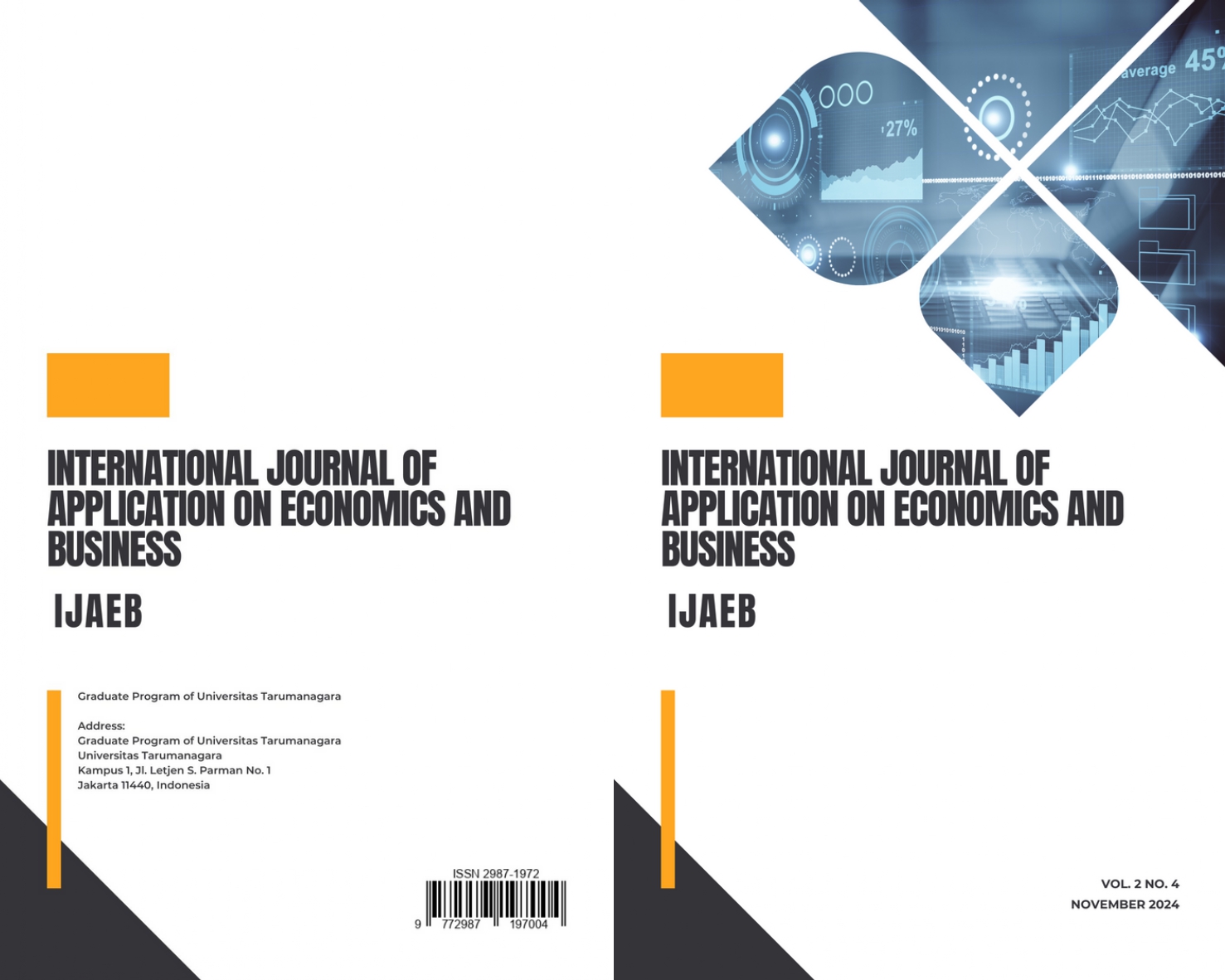THE DETERMINING OF ENTREPRENEURIAL INTENTIONS: A STUDY ON ENTREPRENEURIAL STUDENTS IN JAKARTA
Main Article Content
Abstract
The unemployment rate in Indonesia is very high due to high population growth resulting in an imbalance between job seekers and available jobs. One approach that can be taken to overcome unemployment is through entrepreneurial mechanisms. However, the number of entrepreneurs in Indonesia is still very low so researchers are interested in conducting research related to variables that can affect entrepreneurial intentions in students at management program of economic faculty and business of Tarumanagara University. It involves entrepreneurship education, subjective norms, and entrepreneurial attitudes. The theory of planned behavior serves as the underlying framework for conducting research. The sampling design was carried out using convenience sampling techniques using a sample of 103 students who were or had taken entrepreneurship courses. Data processing methods are applied utilizing the Partial Least Squares-Structural Equation Modeling approach for data analysis. The results indicate that subjective norms and attitudes toward entrepreneurship positively and significantly influenced entrepreneurial intentions, while the impact of entrepreneurship education, although positive, did not reach statistical significance. These results are as information in developing entrepreneurial education programs on campus.
Article Details
Section

This work is licensed under a Creative Commons Attribution-NonCommercial-ShareAlike 4.0 International License.
This journal provides immediate open access to its content on the principle that making research freely available to the public supports a greater global exchange of knowledge.
IJAEB by Graduate Program of Universitas Tarumanagara is licensed under a Creative Commons Attribution-NonCommercial-ShareAlike 4.0 International License.. Permissions beyond the scope of this license may be available at https://journal.untar.ac.id/index.php/ijaeb
References
Bachrawi Sanusi (2004). Pengantar ekonomi pembangunan, Jakarta: PT Rineka Cipta.
Berita Resmi Statistik NO. 35/05/TH. XXVI, 5 MEI 2023.
Dewi, N. L. A. (2016). Pengaruh Sikap Kewirausahaan Terhadap Kemampuan Mengelola Usaha Pada Peserta Program Mahasiswa Wirausaha (PMW) UNDIKSHA Tahun 2015. Jurnal Program Studi Pendidikan Ekonomi (JPPE), 7(2), 1–11. https://doi.org/10.23887/jjpe.v7i2.7741
Franita, R. dan Fuady, A. (2019). Analisa Pengangguran Di Indonesia. Jurnal Ilmu Pengetahuan Sosial, 2 (Desember), 88-93.
Hisrich and Peters. (2002). Entrepreneurship 5th ed. New York: McGraw-Hill.
Hoang, G., Le, T.T.T., Tran, A.K.T., and Du, T. (2021). Entrepreneurship education and entrepreneurial intentions of university students in Vietnam: the mediating roles of self-efficacy and learning orientation. Education + Training, 63 (1), 115-133. https://doi.org/10.1108/ET-05-2020-0142
http://jurnal.um-tapsel.ac.id/index.php/nusantara/article/view/97/97
Joensuu-Salo, S., Viljamaa, A., and Varamäki, E. (2020). Do intentions ever die? The temporal stability of entrepreneurial intention and link to behavior. Education+ Training, 62(3), 352 – 338. https://doi.org/10.1108/ET-03-2019-0053
Joseph A. Schumpeter (1934). The Theory of Economic Development: An Inquiry Into Profits, Capital Credit, Interest, and the Business Cycle. Cambridge: Harvard University Press.
Katadata (2023). ANALISIS: Jumlah Wirausahawan di Indonesia Ganjal Pertumbuhan Ekonomi.
Kautonen, T., Gelderen, M., and Fink, M. (2015). Robustness of the theory of planned behavior in predicting intentions and actions. Entrepreneurship Theory and Practice, 39(3), 655-674. https://doi.org/10.1111/etap.12056
Khaliq, S. A., Soufan, T., and Shihab, R. A. (2014). The Relationship between Unemployment and Economic Growth Rate in Arab Country. Developing Country Studies, 4(7), 62-65. https://iiste.org/Journals/index.php/DCS/article/view/12189
Lopez, T. , Alvarez, C. , Martins, I. , Perez, JP and Románn-Calderón, JP (2021), "Students' perception of learning from entrepreneurship education programs and entrepreneurial intention in Latin America", Academia Revista Latinoamericana de Administración, 34(3), 419-444. https://doi.org/10.1108/ARLA-07-2020-0169
Muthmainah and Cholil, M. (2015). Analysis of Attitude, Experience, Subjective Norm and Behavioral Control on The Entrepreneurial Intention and Behavior: A Case Study toward The Pawners of Sharia Pawnshop of Surakarta Branch Office, Central Java, Indonesia. International Journal of Information, Business and Management, 7(2), 63-76. https://www.proquest.com/scholarly-journals/analysis-attitude-experience-subjective-norm/docview/1657418808/se-2
Nurdwiratno, M. I., Eryanto, H. dan Usman, O. (2023). Pengaruh Locus Of Control Dan Norma Subjektif Terhadap Intensi Berwirausaha Melalui Sikap Berwirausaha Pada Mahasiswa FE UNJ. Sibatik Journal, 2 (2), 583-596. https://doi.org/10.54443/sibatik.v2i2.616
Sahputri, R.A.M., Mawardi, M.K., Yumarni, T. and Sujarwoto (2023). "Entrepreneurship education, family entrepreneurial orientation and entrepreneurial intention among students in Indonesia", Journal of International Education in Business, 16(3), 295-311. https://doi.org/10.1108/JIEB-02-2022-0010
Sarwoko, Endi. (2011). Kajian Empiris Entrepreneur Intention Mahasiswa. Jurnal Ekonomi Bisnis, 16 (2), 126-135.
Soelaiman, L., Puspitowati, I., dan Selamat, F. (2022). Peran Model Panutan terhadap Intensi Berwirausaha Mahasiswa melalui Penerapan Teori Perilaku Terencana. Jurnal Muara Ilmu Ekonomi dan Bisnis, 6(2), 320-329. https://doi.org/10.24912/jmieb.v6i2.20387
Sukirno, S. (2000). Makroekonomi Modern, Jakarta : PT Raja Grafindo Persada.
Wijaya, T. (2007). Hubungan Adversity Intelligence dengan Intensi Berwirausaha. Jurnal Manajemen dan Kewirausahaan, Vol.9 (2) (September), 117- 127. https://jurnalmanajemen.petra.ac.id/index.php/man/article/view/16784

